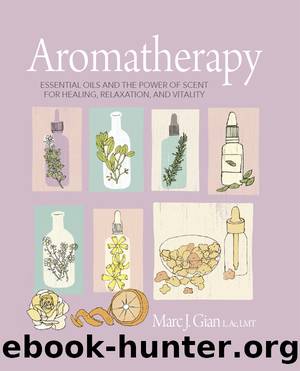Aromatherapy by Marc J. Gian

Author:Marc J. Gian
Language: eng
Format: epub
Publisher: Ryland Peters & Small
Published: 2021-05-16T16:00:00+00:00
Level of Qi:
Ying
Fragrance note:
Middle
Part of the plant:
Needles
Temperature:
Warming
Meridian/organ:
Lung, Kidney
Element:
Metal, Water
Blends well with:
Frankincense, lemongrass, rosemary, tea tree
Physical actions:
Strengthens the Lung Qi and Kidney Qi; eases lower back pain and muscle pain and weakness; increases male libido
Emotional actions:
Helps bring closure; strengthens willpower
Scots pine essential oil is warming and strengthening, and it has a crisp balsam scent. Scots pine has a long history of being used in cough syrups and cold remedies to assist in expelling phlegm.
Scots pine is connected to the Lungs and Kidneys, and, just like tea tree (see page 74), it can strengthen both the Lung Qi and Kidney Qi. Scots pine is often used to expel phlegm from the lungs, strengthen the Lungs, and to bring relief to achy muscles. It can be used in a bath with ravensara and tea tree oils to alleviate the muscle aches associated with the common cold. Its strengthening properties make it an ideal choice to build the Wei Qi (see page 14) after a common cold or illness.
Scots pine strengthens the Kidney Qi, and it is known to benefit the three cardinal signs of Kidney Qi deficiency: low willpower, low libido, and lower back pain. Scots pine is also beneficial to strengthen the Kidney system when it is deficient due to overwork or stress.
This is a key oil for those who tend to dwell on the past, holding on to regret or guilt. When we strengthen the Lung Qi, we are allowing ourselves to take in current life force, which is symbolic of being in the present moment.
Phlegm is a physical blockage that can obstruct breath patterns. However, on an emotional level, those with excess mucus or phlegm may be holding on to negative experiences that lead to low self-confidence. Combining Scots pine with frankincense can break up or transform phlegm to aid in deeper breathing.
Scots pineâs warming nature, analgesic properties, and its connection to the Kidney system are all functions that make it a key oil for treating Cold Bi (see page 128). There are many oils that it can be blended with to help alleviate Cold Bi, including vetiver, ginger, sandalwood, Eucalyptus globulus, ravensara, tea tree, and sweet marjoram.
CAUTION: Using Scots pine
Scots pine oil is high in alpha-pinene, which means that it oxidizes quickly3. To avoid oxidization, the oil should be stored in the refrigerator. If the oil has oxidized, it may cause skin sensitivity.
Download
This site does not store any files on its server. We only index and link to content provided by other sites. Please contact the content providers to delete copyright contents if any and email us, we'll remove relevant links or contents immediately.
Inner Engineering: A Yogi's Guide to Joy by Sadhguru(6796)
The Power of Now: A Guide to Spiritual Enlightenment by Eckhart Tolle(5782)
Fear by Osho(4740)
Ikigai by Héctor García & Francesc Miralles(4274)
The Art of Happiness by The Dalai Lama(4130)
The Ultimate Bodybuilding Cookbook by Kendall Lou Schmidt(3945)
Yoga Therapy by Mark Stephens(3749)
The Little Book of Hygge by Meik Wiking(3694)
The Healing Self by Deepak Chopra(3580)
Why Buddhism is True by Robert Wright(3453)
The Hatha Yoga Pradipika (Translated) by Svatmarama(3342)
Being Aware of Being Aware by Rupert Spira(3276)
Shift into Freedom by Loch Kelly(3199)
Wild Words from Wild Women by Stephens Autumn(3153)
Work Clean by Dan Charnas(3123)
Happiness by Matthieu Ricard(3049)
More Language of Letting Go: 366 New Daily Meditations by Melody Beattie(3030)
Yoga Body & Mind Handbook by Jasmine Tarkeshi(2880)
Why I Am Not a Feminist by Jessa Crispin(2760)
